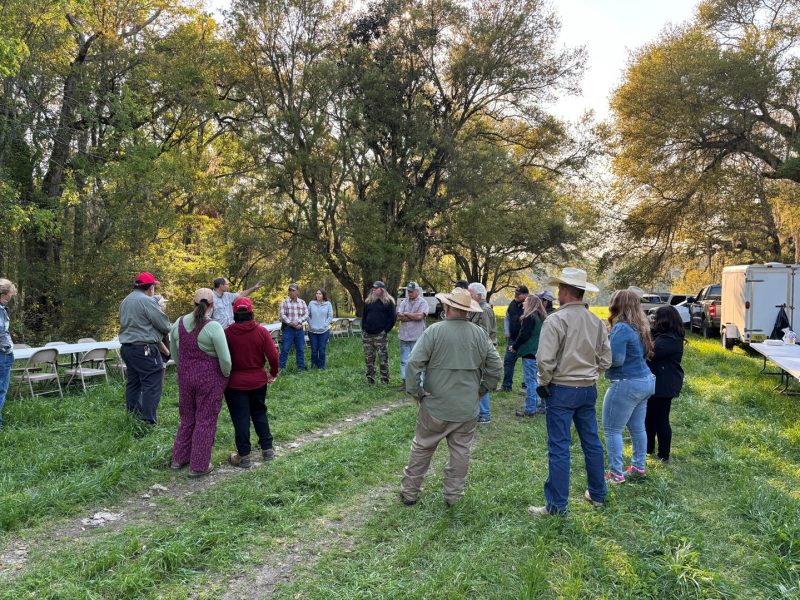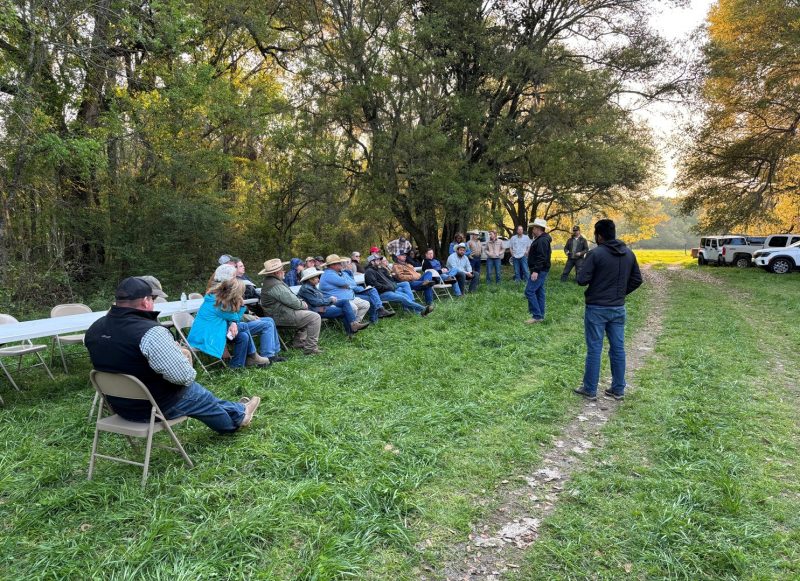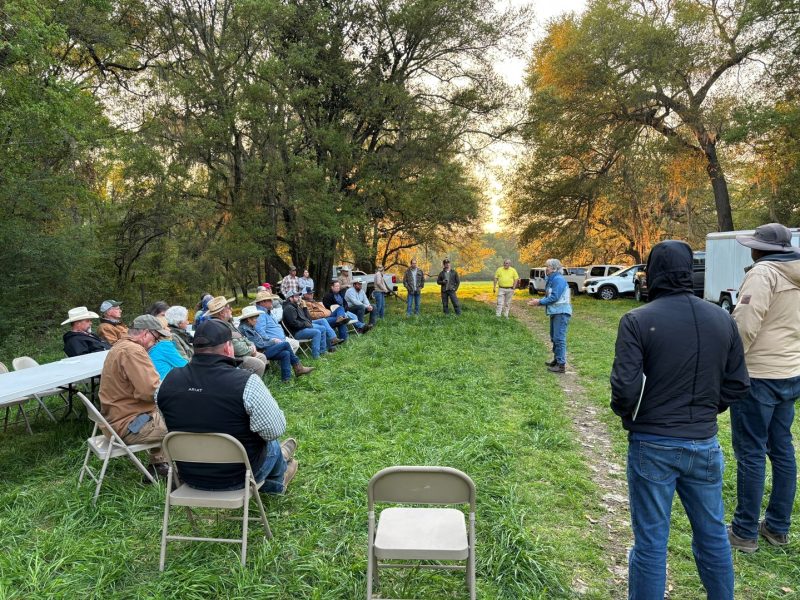UF/IFAS Extension Jefferson County and FAMU Extension held a highly successful Spring Pasture Walk and Talk on March 19th, 2024, at Finlayson Farms. Cattle ranchers, Extension Agents, and researchers from around North Florida attended this event to learn about the history of Finlayson Farms, the benefits of rotational grazing, the use of legumes, marketing freezer beef, and Water Quality Best Management Practices (BMP’s). This program was designed for cattle producers to see first-hand the impact of using these management systems on a successful cattle operation.
This program was casual and designed for the participants to have more one-on-one interaction with the guest speakers and researchers who were there to share their knowledge. Dr. Dean Pringle (UF/IFAS-NFREC Director), Dr. Cheryl Mackowiak (UF/IFAS-NFREC Soil Fertility Scientist), and Stephen Monroe (FDACS Technician) were the guest speakers for the program. They came prepared to share their knowledge and answer questions that participants had.
Finlayson Farm’s is owned and operated by Mack Finlayson and family. His family has owned land and utilized it for agricultural purposes since the late 1800’s. Cattle were introduced in the 1960’s and that has been their focus ever since. This was a wonderful place to hold this event because Mack has been implementing rotational grazing and grazing legumes for many years. Mack rotates his cattle through 7 separate pastures to give each pasture time to rest. He plants a blend of winter forages that consist of oats, rye, ryegrass and crimson clover. Mack Finlayson summarized their success by saying, “These systems have been a blessing for my operation because we are able to feed less hay, keep our stocking rates up, while cutting our Nitrogen application rate in half.”
Dr. Dean Pringle (UF/IFAS NFREC Director) started off the program by discussing the benefits of adding a freezer beef component to your cattle operation. Dean highlighted that adding the component of freezer beef is a wonderful way to diversify your operation while adding value and revenue. He went over the different marketing strategies, and the associated regulations. He also discussed the pros and cons of the different finishing methods that can be used. Forage only, pasture supplemented, and grain finished are all effective ways of getting your product finished for the consumer, but it is important to understand the method that fits your operation the best, and the time and management required for each system.

Dr. Dean Pringle, NFREC Director, discuss the benefits of adding freezer beef production to cow-calf operations, and the Jefferson County Pasture Walk. Credit: Ben Hoffner, UF/IFAS.
–
Stephen Monroe with the Florida Department of Agriculture & Consumer Services discussed the importance of the BMP (Best Management Practices) Program and what they do for your operation. He talked about the importance of conserving and protecting soil and water through BMP’s. Participants were able to see some of the BMP’s that Mack Finlayson was using in his operation such as water tanks and culvert pipes that help reduce the risk of soil erosion and soil loss that Stephen helped him install. Stephen discussed the cost share program where the FDACS office of Ag Water Policy receives funding through the Florida Legislature to assist farmers in implementing best management practices.

Stephon Monroe discussed how the BMP Program can benefit Florida Ranchers. Credit: Ben Hoffner, UF/IFAS
–
Dr. Cheryl Mackowiak, UF/IFAS Soil Scientist, discussed the main focus of this event, which was the importance of nutrient recycling through legumes and rotational grazing. Cheryl identified the crimson clover growing in the pastures and described soil and environmental factors needed for successful production of crimson clover. She discussed how legumes utilize a symbiotic relationship with bacteria to fix atmospheric nitrogen. She explained that planting legumes is beneficial because they allow you to cut down on the amount of nitrogen you have apply to your pastures while also adding a valuable, high-quality forage for your livestock. Dr. Mackowiak also shared some insight on how rotational grazing helps with the recycling of nutrients in your pastures, because you have more control of animal movement.

Dr. Cheryl Macokwiak discussed how adding legume forages to pastures and rotational grazing benefit both the soil fertility and the quality of forage produced. Credit: Ben Hoffner, UF/IFAS
–
For more information, use the following links, or contact your local UF/IFAS Extension Office.
SS-AGR-49/DS127: Winter Forage Legume Guide
Impact of Grazing Methods on Forage and Cattle Production
Grazing Management Concepts and Practices
- Soil Testing, a Key Component of Panhandle Pasture Management - March 14, 2025
- Pasture & Hayfield Fall Armyworm Control - September 20, 2024
- 2024 Jefferson County Pasture Walk Recap - April 5, 2024
